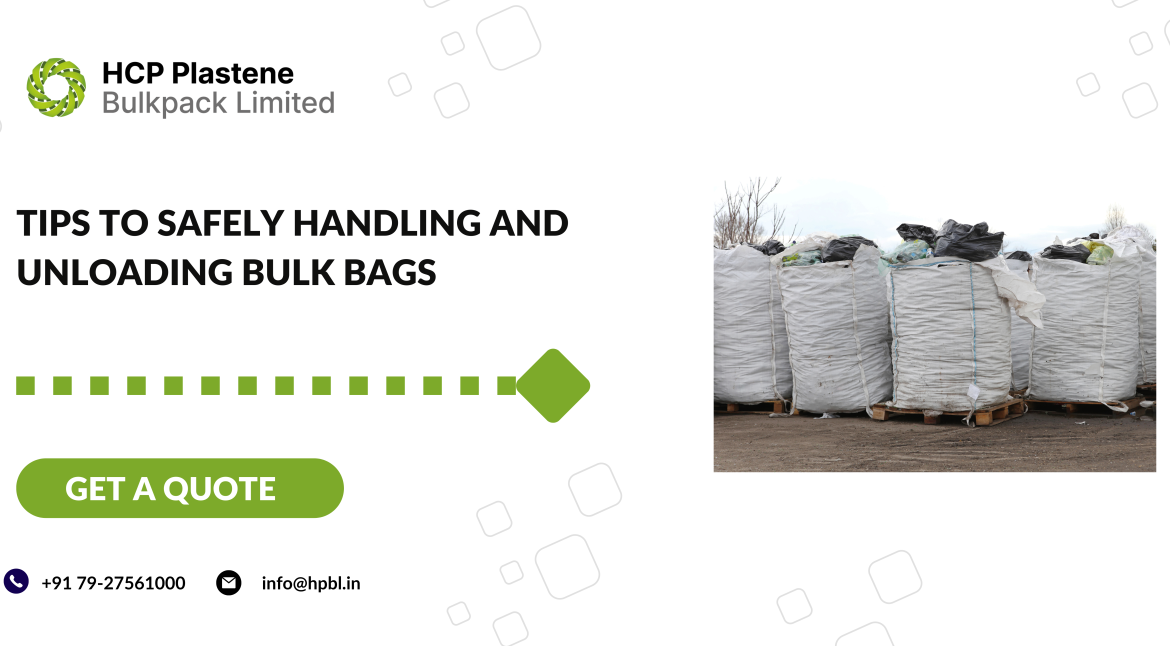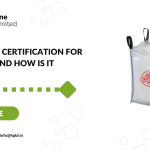Flexible intermediate bulk containers, or FIBCs, are often used for shipping and product storage. Bulk bag manufacturers make them in a variety of sizes and materials to securely hold a wide range of goods. Bulk bags carry their own set of safety hazards even though they are convenient and beneficial. When using FIBCs, you must always follow certain safety precautions since it’s important to be safe when using bulk bags. Here are some key tips from HPBL for handling bulk bags safely:
Filling the bulk bags safely
Verify that the bag is authorized for the item.
Bulk bags are used to store and move a variety of goods and commodities, from wheat and grains to dangerous substances. It’s important to use the appropriate bag for the product being handled. Using the right bags helps guarantee that the product is stored properly without endangering the bag or even hurting the person using it.
Fill bags at the appropriate place
Avoidable injuries can be avoided by filling bags in a suitable setting. For instance, putting combustible or explosive goods in a bulk bag may cause static electricity. Anyone near the bag might suffer severe, potentially fatal damage if this voltage is released in an unsuitable setting. Filling and emptying bags in the proper setting is the best practice.
Verify the Bag’s Security
Make sure a bulk bag is securely fastened before filling it. To keep the bag from dropping while being filled, hold it open while the discharge nozzle is securely closed. To guarantee stability and keep the bag from falling over and endangering you or your staff, it’s also critical to fill it equally with the goods.
Don’t go beyond the safe working load (SWL) or rated capacity.
You should always keep below a bag’s SWL or rated capacity, per the Flexible Intermediate Bulk Container Association’s (FIBCA) FIBC safe handling
recommendations. The likelihood of bag failure rises sharply if the capacity is exceeded.
Monitor for Wear and Tear
Inspect bags for visible damage, such as tears, punctures, or weakened seams, before filling, and avoid reusing bags not designed for multiple trips.
Safety Tips for Unloading Bulk Bags
If you don’t know how to correctly unload FIBC bulk bags, it might be dangerous. Remember these safety precautions if you or your staff are unloading or discharging goods from the bags:
Control the dust:
When the bags are being emptied, they will probably produce a lot of dust if the contents are dry. Make sure you have ways to regulate the dust, such as a ventilation system, because this may contaminate the air and create a fire danger.
Control static:
Powders and other materials that flow quickly out of bulk bags release a static that, under the right circumstances, might ignite particles and explode. Ground the frame utilized to unload the bulk bags to assist reduce the chance of static.
Don’t cut the bag:
Cutting the bag at the point of discharge spout could be faster, but there may be additional dangers involved. Rather, spend some time untying the bag’s opening to ensure a safe and appropriate discharge.
Secure the Bag During Emptying:
Use a reliable unloading frame to keep the bag stable while discharging its contents.
Safety Tips for Bulk Bags Storage
Safe bulk bag stacking:
Not all bulk bags are made to be stacked. If your bags are made to stack, you should support them by placing them against two walls or in a pyramid.
Store bulk bags in covered areas:
To prevent FIBCs from the sun, moisture, and bad weather, it is advisable to store them in covered warehouses or facilities.
Utilize pallets:
Pallets can facilitate bag transportation and help keep bulk bags off the ground. Just make sure there are no sharp edges, nails, or other anything that may harm the bags, and that they are the right size.
Label Stored Bags Clearly:
Use clear labels to identify bag contents and weight limits to avoid mishandling.
Follow Fire Safety Measures:
Keep fire extinguishers readily available in storage areas and maintain a safe distance between bulk bag stacks and ignition sources.
General Safety Guidelines for Bulk Bag Handling
Train Your Workforce
- Ensure workers are trained on safe handling techniques, equipment use, and emergency procedures.
Use Proper Lifting Equipment
- Always use certified forklifts, cranes, or hoists with appropriate attachments to lift bulk bags safely.
- Never lift a bag by its loops unless the equipment is designed for this purpose.
Inspect Regularly
- Conduct routine checks on bulk bags, storage areas, and handling equipment.
- Replace damaged bags immediately to avoid accidents.
HPBL’s commitment to safety and quality in bulk bag manufacturing ensures that its FIBCs meet stringent industry standards. By following these safety guidelines, companies can optimize the performance of HPBL bulk bags while minimizing risks to workers and materials.
Best Practices for Reusing Bulk Bags
Understand Bag Types for Reuse
Not all bulk bags are designed for multiple uses. Single-use (one-trip) bags should never be reused, even if they appear to be in good condition. Multi-trip bags, on the other hand, are constructed with reinforced seams and a higher safety factor (usually 6:1). If you plan to reuse a bag, always confirm that it’s rated for multiple uses and meets FIBC standards.
Inspect Before Every Reuse
Before reusing any bag, conduct a thorough inspection for:
- Fabric integrity
- Stitching quality
- Loop strength
- Signs of UV degradation
Any compromised component can lead to failure during use and should be addressed before putting the bag back into service.
Clean and Decontaminate Properly
Reused bags must be cleaned to avoid contamination—especially if they were previously used for food products or chemicals. Use appropriate cleaning methods depending on the bag’s liner and former contents. Avoid harsh chemicals that can degrade the material or compromise bag safety.
Environmental Considerations for FIBC Use
Choose Eco-Friendly Options
Many FIBC bags are recyclable, and several manufacturers, including HPBL, now offer bags made with partially recycled materials without compromising strength. Look for bags marked as recyclable or compliant with eco-friendly guidelines if environmental impact is a concern.
Proper Disposal of Damaged Bags
Bags that can no longer be used or repaired should be disposed of responsibly. Separate liners from the outer fabric if necessary and check with local recycling regulations. Avoid burning or dumping bags as this contributes to pollution and may violate compliance standards.
Participate in Bulk Bag Recycling Programs
Some manufacturers and suppliers offer take-back or recycling programs. Partnering with such services not only helps in sustainable operations but also strengthens your brand’s green credentials.
Common Mistakes to Avoid While Handling Bulk Bags
Lifting Bags Incorrectly
One of the most common causes of FIBC failure is incorrect lifting. Never lift bags using hooks through the loops unless the loops are designed for such handling. Loops must always be vertical during lifting to evenly distribute the load.
Ignoring Load Distribution
Improper filling or uneven weight distribution can lead to tipping, bursting, or unstable stacking. Always aim for even filling and use baffles if the bag needs to retain a box-like shape for efficient stacking.
Overlooking Weather Conditions
FIBCs can degrade if left in open environments for prolonged periods. Bags exposed to sunlight for too long may suffer UV damage, while those stored in damp conditions may develop mould or weaken. Always store bulk bags in dry, shaded or covered environments.
Why Partnering with a Trusted Manufacturer Matters
At HPBL, we don’t just manufacture bulk bags—we help businesses maintain the highest safety and quality standards in their supply chains. Our FIBC bags undergo stringent testing, including top lift, drop, and UV resistance tests, to ensure they meet international benchmarks.
What You Get with HPBL FIBC Bags:
- Customised solutions for food, chemical, or construction-grade needs
- Options for Type A, B, C, and D bags depending on electrostatic requirements
- Consistent quality control with documented testing
- Expert support for handling and storage best practices
Final Words
Handling, unloading, and storing FIBC bulk bags requires more than just basic operational knowledge—it demands attention to detail, consistent inspection, and adherence to safety standards. By incorporating these additional tips and working with a reliable manufacturer like HPBL, businesses can ensure that safety and efficiency go hand in hand.










